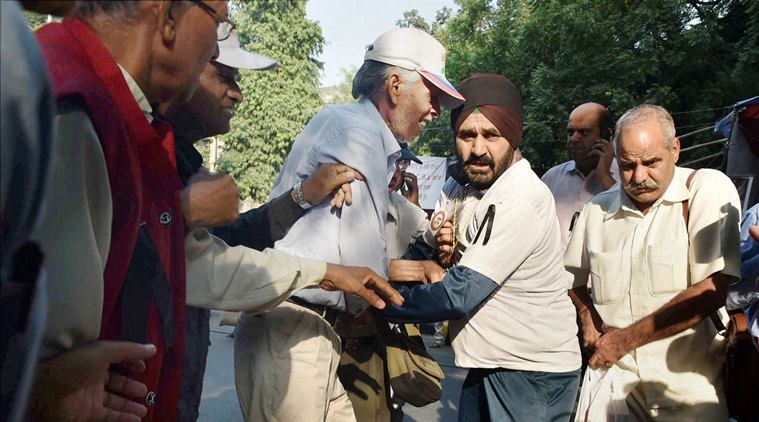Opinion The OROP quicksand
Veterans risk losing public support due to their immoderate position. Government needs to reach out, soothe tempers.

 Few veteran servicemen try to burn their medals during a protest against the One Rank One Pension scheme announced by the government, in New Delhi on Wednesday. (Source: PTI)
Few veteran servicemen try to burn their medals during a protest against the One Rank One Pension scheme announced by the government, in New Delhi on Wednesday. (Source: PTI)
The ex-servicemen agitating for one rank one pension (OROP) have rejected the government notification and ratcheted up their protests by returning their medals. Some ex-servicemen even tried to set fire to their medals, but were prevented from doing so by their colleagues. Emotions have been frayed and tempers rising over the OROP issue for a few years now. During the tenure of the UPA 2, too, ex-servicemen had returned their medals while making the same demand. The current upping of the ante follows five months of protest at Jantar Mantar, including an episode of mishandling by the police before Independence Day and fasts by some veterans, an announcement by the defence minister before the Bihar elections, and the issuance of a government notification before Diwali. Both sides have made mistakes.
There are seven points of disagreement between the ex-servicemen and the government. They include revision of pensions on a yearly basis while the government has notified a five-yearly revision, and the fixation of pension at the maximum of current retirees while the government has notified an average of the maximum and minimum. Another issue involves the exclusion of soldiers who seek premature retirement from the ambit of OROP. While the government has agreed to grant OROP to those who have already sought premature retirement, it will deny the provision to those who seek premature retirement from now on. This has understandably caused a lot of heartburn among serving military personnel. The defence forces are steeply hierarchical and nearly 70 per cent of pensioners are premature retirees who chose to move to civilian life once they miss out on promotions. There is good reason for the government to relook at this clause.
But OROP is a demand no government can afford to completely fulfil because of the open-ended financial burden it imposes on the economy. Having partially met the demands of the ex-servicemen and announced a one-member judicial commission, the government would have expected the veterans to call off their protests. Because the veterans feel betrayed by a government that came to power promising full OROP — and the top political leadership has not taken them into confidence during decision-making — their position has hardened. The veterans risk losing public support because of their extreme stance. But the political leadership also needs to reach out to the veterans. With the broad parameters fixed, an agreement over the details can be reached, bringing this unsavory episode to a close.




